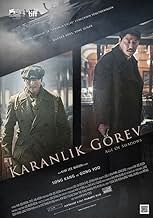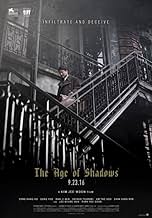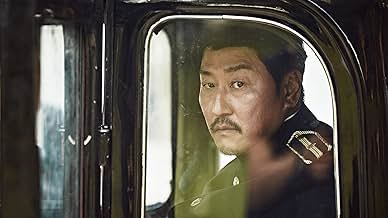CALIFICACIÓN DE IMDb
7.1/10
12 k
TU CALIFICACIÓN
Los combatientes de la resistencia coreana hacen contrabando de explosivos para destruir instalaciones controladas por las fuerzas japonesas en este thriller de acción de período.Los combatientes de la resistencia coreana hacen contrabando de explosivos para destruir instalaciones controladas por las fuerzas japonesas en este thriller de acción de período.Los combatientes de la resistencia coreana hacen contrabando de explosivos para destruir instalaciones controladas por las fuerzas japonesas en este thriller de acción de período.
- Dirección
- Guionistas
- Elenco
- Premios
- 16 premios ganados y 41 nominaciones en total
- Dirección
- Guionistas
- Todo el elenco y el equipo
- Producción, taquilla y más en IMDbPro
Opiniones destacadas
A period drama pierced with elements of action & thriller that's polished in all filmmaking aspects and manages to be a tense, riveting ride for the majority of its runtime, The Age of Shadows maintains its gripping aura for the first two acts with its cleverly constructed & palpably tense cat-n-mouse premise but falters during the final act that feels a tad too drawn out & melodramatic. Worth a shot for the impressive set pieces it has in store.
South Korean thrillers rarely misfire even if they aren't that well reviewed or rated. Coming for Kim Jee-woon, who masterfully directed "I Saw the Devil" and "A Bittersweet Life", "The Age of Shadows" makes a notable entry to his filmography. The Western audience doesn't really get to see period South Korean film set in early 20th century and it gives us a chance to perceive life on the Eastern front.
"The Age of Shadows" takes place in the 1920's around a back-and-forth game between a group of resistance fighters and Japanese agents. The film is deeply rooted in the Korean independence movement from the Empire of Japan. While most of the people back home wanted to gain independence, they could not do anything in front of the strong Japanese authorities. The key was to form resistance groups to overtake the Japanese dominion.
The film stars two of South Korea's biggest actors working in the industry today, Song Kang-ho and Lee Byung-hun. They have paved the way of the South Korean new wave by delivering outstanding performances that helped the film industry achieve new heights. In "The Age of Shadows" they play on the opposite side of the fences, Song as a Korean police officer charged to sniff out the resistance and Lee as the leader of the resistance fighters. Lee's character begins to sense that the police officer can turn ways and be persuaded to help the resistance by feeding them information. At this point the wheels start to be in motion and it will be a very bumpy and eventful train ride, literally.
"The Age of Shadows" is a good period thriller with twists and turns that will keep you entertaining until the end.
"The Age of Shadows" takes place in the 1920's around a back-and-forth game between a group of resistance fighters and Japanese agents. The film is deeply rooted in the Korean independence movement from the Empire of Japan. While most of the people back home wanted to gain independence, they could not do anything in front of the strong Japanese authorities. The key was to form resistance groups to overtake the Japanese dominion.
The film stars two of South Korea's biggest actors working in the industry today, Song Kang-ho and Lee Byung-hun. They have paved the way of the South Korean new wave by delivering outstanding performances that helped the film industry achieve new heights. In "The Age of Shadows" they play on the opposite side of the fences, Song as a Korean police officer charged to sniff out the resistance and Lee as the leader of the resistance fighters. Lee's character begins to sense that the police officer can turn ways and be persuaded to help the resistance by feeding them information. At this point the wheels start to be in motion and it will be a very bumpy and eventful train ride, literally.
"The Age of Shadows" is a good period thriller with twists and turns that will keep you entertaining until the end.
"The Age of Shadows" is a historically inspired dramatic action-thriller about a group of Korean resistance fighters who are opposing the peninsula's Japanese occupation. Directed and written by creative mastermind Kim Jee-won and starring South Korean top actors like Lee Byung-hun, this epic film became South Korea's official submission for the "Best Foreign Language Film" category of the 89th Academy Awards in 2017. While the premises seemed to be very positive, I was slightly disappointed by the movie.
First of all, a much better movie with a very similar story line called "Assassination" was released only one year earlier and it beats this flick in terms of acting, pace, settings and story. It's quite difficult to identify with the main character in "The Age of Shadow" who constantly changes sides and doesn't seem to know what he believes in. Instead of portraying a man torn between two choices, the movie focuses on a rather antipathic and egoistic character who is thinking about his own advantage at all times. Even an outstanding actor like Song Kang-ho can't make this dull main character any more exciting.
"The Age of Shadow" starts with an explosive opening scene only to lead towards a lengthy introduction with endless dialogues and numerous characters. It takes close to one hour before the pace quickens up again. The first half of the movie is definitely too long and often lost my interest.
While the settings of the movie are very realistic and bring to life a genuine depiction of the Korean peninsula in the forties, the costumes and locations aren't as detailed and memorable as in many other South Korean high-quality productions.
The story remains somewhat shallow in my opinion. It's obvious that the members of the resistance are trying to attack the Japanese occupants but the film never really explains what they are organizing precisely. It's quite unsatisfying to realize that the resistance's charismatic leader is taking many risks by trusting a highly unreliable main character and personally organizing an attack against the enemy that is never ever specified. The ending also leaves many questions open and feels unfinished to me.
Despite these flaws, the movie also has many strong points. The side characters are portrayed excellently and add some depth to the movie. Especially the clever villain portrayed by Um Tae-goo is very creepy. The movie also convinces in its more intense passages. The opening scene is both dynamic and memorable. The climax on the train is very tense and will get you on the edge of your seat. The last thirty minutes of the film have a welcome dramatic and emotional touch. The settings are authentic and especially the scenes on the train, in different torture chambers and in the prison are beautifully crafted and provide a gripping and sinister atmosphere. While the story is maybe the movie's biggest flaw, it still requests some thinking from the audience and includes a few minor twists in the second half of the film that save this movie for me.
Maybe my rating would be slightly more generous if the excellent "Assassination" hadn't been released a year earlier. That film's excellent execution from any point of view makes "The Age of Shadows" look quite predictable, redundant and even unnecessary. Faithful fans of contemporary South Korean cinema should still watch both movies but I would only recommend "Assassination" to occasional international audiences. "The Age of Shadows" really pales in comparison to Choi Dong-hoon's "Assassination". On a closing note, South Korea should have chosen the outstanding horror film "The Wailing" as official submission for the "Best Foreign Language Film" category of the 89th Academy Awards in 2017.
First of all, a much better movie with a very similar story line called "Assassination" was released only one year earlier and it beats this flick in terms of acting, pace, settings and story. It's quite difficult to identify with the main character in "The Age of Shadow" who constantly changes sides and doesn't seem to know what he believes in. Instead of portraying a man torn between two choices, the movie focuses on a rather antipathic and egoistic character who is thinking about his own advantage at all times. Even an outstanding actor like Song Kang-ho can't make this dull main character any more exciting.
"The Age of Shadow" starts with an explosive opening scene only to lead towards a lengthy introduction with endless dialogues and numerous characters. It takes close to one hour before the pace quickens up again. The first half of the movie is definitely too long and often lost my interest.
While the settings of the movie are very realistic and bring to life a genuine depiction of the Korean peninsula in the forties, the costumes and locations aren't as detailed and memorable as in many other South Korean high-quality productions.
The story remains somewhat shallow in my opinion. It's obvious that the members of the resistance are trying to attack the Japanese occupants but the film never really explains what they are organizing precisely. It's quite unsatisfying to realize that the resistance's charismatic leader is taking many risks by trusting a highly unreliable main character and personally organizing an attack against the enemy that is never ever specified. The ending also leaves many questions open and feels unfinished to me.
Despite these flaws, the movie also has many strong points. The side characters are portrayed excellently and add some depth to the movie. Especially the clever villain portrayed by Um Tae-goo is very creepy. The movie also convinces in its more intense passages. The opening scene is both dynamic and memorable. The climax on the train is very tense and will get you on the edge of your seat. The last thirty minutes of the film have a welcome dramatic and emotional touch. The settings are authentic and especially the scenes on the train, in different torture chambers and in the prison are beautifully crafted and provide a gripping and sinister atmosphere. While the story is maybe the movie's biggest flaw, it still requests some thinking from the audience and includes a few minor twists in the second half of the film that save this movie for me.
Maybe my rating would be slightly more generous if the excellent "Assassination" hadn't been released a year earlier. That film's excellent execution from any point of view makes "The Age of Shadows" look quite predictable, redundant and even unnecessary. Faithful fans of contemporary South Korean cinema should still watch both movies but I would only recommend "Assassination" to occasional international audiences. "The Age of Shadows" really pales in comparison to Choi Dong-hoon's "Assassination". On a closing note, South Korea should have chosen the outstanding horror film "The Wailing" as official submission for the "Best Foreign Language Film" category of the 89th Academy Awards in 2017.
If you said to me that a Korean Film can beat 95% of the top films produced in the last 20 years, I would have serious doubts. To explain, I am an Hollywood Worshipper, a Hollywood lover and a picture goer with strong views, likes and dislikes. What we have here is a film that is in the same 'sleeper league; as the ShawShank Redemption, a film with a wonderful story, script, a great cast and one of the best films I have seen for ages. It shown on British TV 23 October 2019, my wife put it on, when she saw it was Korean she lost interest and went to bed, big mistake, I stayed, and was totally hypnotised and absorbed with it, great technical strides have been made in the last 40 years in every department of film production - but in Korea, with a foreign cast, with no familiar names, a film made for adults not 11-year old children, without one car chase, or male film star whose next film is to save the world, or rescue it from Mr Evil Doom, this Korean film Age of Shadows, is one to be fond of, to watch again and again, and in some respects to relive your great film memories sitting in the Empire Cinema, Stockton on Tees, England, when sitting in the Nine-Penny seats watching the African Queen, All About Eve, or the Wizard of Oz, Yes, it is that good. Watch it.
* This was South Korea's official submission for the Best Foreign Language Oscar of 2016. There were four, notable SK movies released in 2016 and this movie was the one officials felt was the best to submit....boy were they wrong. Both "The Handmaiden" and "The Wailing" are simply superior in just about every reguard.
* The movie is not bad by any measure, it's technical merits (cinematography, acting, production design, etc) are all great. The movie has a great stoic, 1920s feeling to it. And Song Kang-ho is outstanding (no surprise here). This was clearly well planned and organized by top workers in SK. It just didn't have a strong story behind all the great acting and camera-work.
* It's the story that feels just a tad underwhelming. It ends up going exactly where you expect it to (with a few MINOR surprises along the way). But right from the get go, you know where this one is heading. And it's this predictability and makes the 2 hours and 15 minutes feel a bit long.
* When all's said and done, this is a good movie from South Korea, but not great. It's not among the all time greats (and boy there are a lot), and it's not even the best movie from South Korea in 2016. But if you are a fan of period dramas (this one is light on action), then this is something you should check out.
* The movie is not bad by any measure, it's technical merits (cinematography, acting, production design, etc) are all great. The movie has a great stoic, 1920s feeling to it. And Song Kang-ho is outstanding (no surprise here). This was clearly well planned and organized by top workers in SK. It just didn't have a strong story behind all the great acting and camera-work.
* It's the story that feels just a tad underwhelming. It ends up going exactly where you expect it to (with a few MINOR surprises along the way). But right from the get go, you know where this one is heading. And it's this predictability and makes the 2 hours and 15 minutes feel a bit long.
* When all's said and done, this is a good movie from South Korea, but not great. It's not among the all time greats (and boy there are a lot), and it's not even the best movie from South Korea in 2016. But if you are a fan of period dramas (this one is light on action), then this is something you should check out.
¿Sabías que…?
- TriviaThis film is Warner Bros. first Korean production.
- ErroresIn the train one of the resistance members open the pocket watch with QUARTZ inscription on dial. Second hand of the watch moves in distinct steps reaffirming they have a quartz movement inside. Quartz watch was not invented in 20s and was not available till late 60s.
- Citas
Jung Chae-San: Even when we fail, we move forward. The failures accrue, and we tread on them to advance to higher ground.
- Créditos curiososThe Warner Bros logo is set on a quiet street.
- ConexionesFeatured in Boléro, le refrain du monde (2019)
- Bandas sonorasWhen you're smiling
Written by Larry Shay (uncredited), Mark Fisher (uncredited) and Joe Goodwin (uncredited)
Performed by Louis Armstrong
Selecciones populares
Inicia sesión para calificar y agrega a la lista de videos para obtener recomendaciones personalizadas
- How long is The Age of Shadows?Con tecnología de Alexa
Detalles
- Fecha de lanzamiento
- Países de origen
- Sitios oficiales
- Idiomas
- También se conoce como
- The Age of Shadows
- Locaciones de filmación
- Productoras
- Ver más créditos de la compañía en IMDbPro
Taquilla
- Presupuesto
- USD 8,620,000 (estimado)
- Total en EE. UU. y Canadá
- USD 541,719
- Fin de semana de estreno en EE. UU. y Canadá
- USD 165,685
- 25 sep 2016
- Total a nivel mundial
- USD 54,491,162
- Tiempo de ejecución2 horas 20 minutos
- Color
- Mezcla de sonido
- Relación de aspecto
- 2.39 : 1
Contribuir a esta página
Sugiere una edición o agrega el contenido que falta

Principales brechas de datos
What is the Canadian French language plot outline for Mil-jeong (2016)?
Responda




































